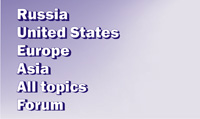


Articles
National flag of Russian Federation hoisted on Yakutia nuclear icebreaker
Reactor pressure vessel of Xudapu NPP Unit 4 has been installed in design position
China offers the world a solution through nuclear technology applications
Alexey Likhachev attended the launching ceremony of Chukotka nuclear icebreaker
Rosatom manufactures first nuclear fuel for a research reactor in Bolivia
Press Releases
34th Rossing Marathon held in Namibian Swakopmund
Rosatom to Co-host The Arctic - A Territory of Dialogue International Arctic Forum

Victor Murogov: work on preservation of nuclear knowledge continues
In the International Atomic Energy Agency continues work on realization the program for preservation of nuclear knowledge. Web-site AtomInfo.Ru asked Victor Murogov, who was IAEA Director General Deputy in 1996-2003, to tell about the state of this program. Today Victor Mikhailovich is one of active participants of the program for preservation of knowledge.
I take part in realization IAEA's program for preservation of nuclear knowledge, which we have begun yet at that time when I was IAEA Director General Deputy - in 2001. This program was arisen in accordance with the proposal of developing countries under support of the West states, and now it is at the final stage of realization.
IAEA issued a set of reports containing the opinions of scientists about why it is necessary to take care of knowledge preservation just in nuclear power. Now the search of consensus is going regarding to understanding what namely should be preserved and how it is necessary to do it.
If to tell about the first item of work (why the nuclear knowledge deserves special concern) the corresponding guidance about specificity of nuclear knowledge was prepared by IAEA. It says about necessity of nuclear knowledge preservation for successful operation of NPP, for industry and nuclear safety.
The last IAEA meeting, in which I took part, was held in November and it was devoted to nuclear knowledge preservation for innovation development, for research organizations. In one of these days a new meeting will launch, where different aspects of knowledge preservation in the area of fast reactors and educational sphere will be considered.
Specificity of nuclear knowledge is due to, first of all, their expensiveness, complexity, long duration and arising of serious negative consequences with their loss.
I'd like to remember two known examples. The Moon program of the USA was USA $180 billion, today loss of experience and knowledge is estimated to be USA $160-170 billion. The fate of the rest 10-20 billions is also called in question. It is very simple to explain - the Americans didn't approve special program for knowledge preservation in the years of the Moon knowledge race, as time went on, by natural reasons, they had been lost.
Let's come back to nuclear branch, to accident at TMI-2. Nowadays the Americans have clear understanding that this accident occurred due to lack of analysis of the previous accidents and incidents. Because all events subsequently occurred at NPP "Three Mile Island", took place at other reactors separately.
The work on creation of mechanism for managing knowledge is also carried out in IAEA. I'll cite an example. Now the question is under consideration of choosing optimal way for knowledge transfer to developing countries. Here no simple dilemma arises. From the safety viewpoint, it is better to transfer more knowledge. From the non-proliferation viewpoint, it should be chosen clearly what can be transferred and what is not to be recommended to transfer or simply not to do it.
SOURCE: AtomInfo.Ru
DATE: December 17, 2007
Topics: Russia, Victor Murogov, Fast breeders